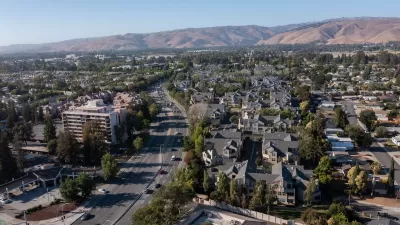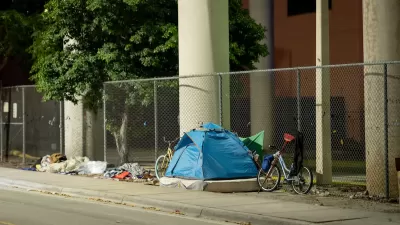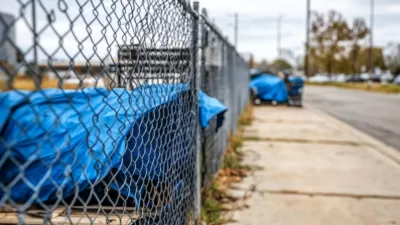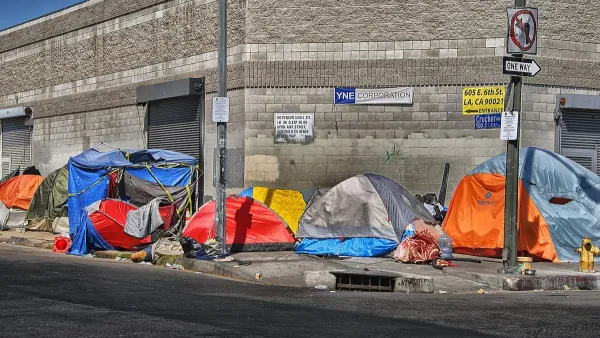Non-profits worry the ordinance, which does not explicitly exempt service providers, will have a chilling effect on unhoused residents and those who offer resources.

The San Francisco Bay Area city of Fremont passed one of the state’s most punitive laws against homeless residents, banning camping on public property and making it illegal to “permit, aid, or abet” encampments over the objections of non-profits and service providers. At the last count, Fremont had roughly 1,000 unhoused residents, while the city only provides 100 shelter beds.
As Dani Anguiano reports in The Guardian, “The city attorney said the ordinance does not make it illegal to provide food or aid to unhoused people. The council briefly considered amending the proposal to explicitly state that the ordinance would not affect aid workers but ultimately opted not to and the ordinance passed with just one councillor opposing it.”
The law has been widely condemned by advocates and civil rights groups. A letter to the city council signed by almost 20 groups stated that the ordinance would lead to “legal liability and devastating humanitarian consequences.” During the city council meeting when the council voted for the ordinance, hundreds of people showed up to protest the proposal, while other residents expressed support, citing concerns about safety.
Fremont is just one of many cities enacting laws targeting unhoused residents in the wake of the Supreme Court's Grants Pass v. Johnson decision last year, which allows cities to make houselessness illegal even when shelter space is not available.
FULL STORY: ‘Poverty is not a crime’: outrage after California city passes law targeting homeless encampments

Planetizen Federal Action Tracker
A weekly monitor of how Trump’s orders and actions are impacting planners and planning in America.

Chicago’s Ghost Rails
Just beneath the surface of the modern city lie the remnants of its expansive early 20th-century streetcar system.

San Antonio and Austin are Fusing Into one Massive Megaregion
The region spanning the two central Texas cities is growing fast, posing challenges for local infrastructure and water supplies.

Since Zion's Shuttles Went Electric “The Smog is Gone”
Visitors to Zion National Park can enjoy the canyon via the nation’s first fully electric park shuttle system.

Trump Distributing DOT Safety Funds at 1/10 Rate of Biden
Funds for Safe Streets and other transportation safety and equity programs are being held up by administrative reviews and conflicts with the Trump administration’s priorities.

German Cities Subsidize Taxis for Women Amid Wave of Violence
Free or low-cost taxi rides can help women navigate cities more safely, but critics say the programs don't address the root causes of violence against women.
Urban Design for Planners 1: Software Tools
This six-course series explores essential urban design concepts using open source software and equips planners with the tools they need to participate fully in the urban design process.
Planning for Universal Design
Learn the tools for implementing Universal Design in planning regulations.
planning NEXT
Appalachian Highlands Housing Partners
Mpact (founded as Rail~Volution)
City of Camden Redevelopment Agency
City of Astoria
City of Portland
City of Laramie





























